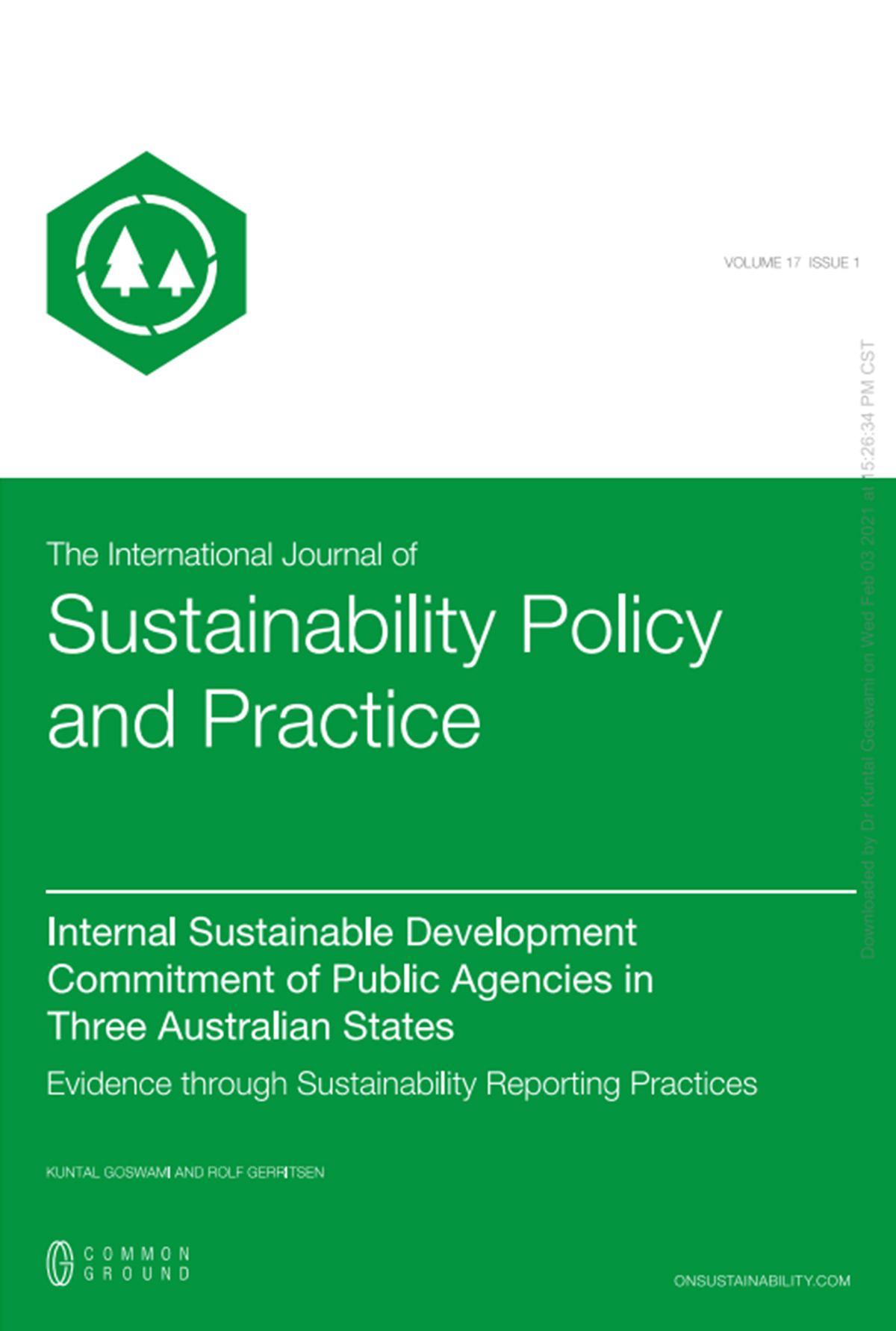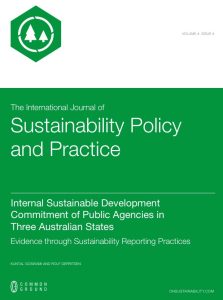Journal Articles
Internal Sustainable Development Commitment of Public Agencies in Three Australian States Evidence through Sustainability Reporting Practices
Internal Sustainable Development Commitment of Public Agencies in Three Australian States: Evidence through Sustainability Reporting Practices
Author: Dr Kuntal Goswami, Central Queensland University, Australia; Prof. Rolf Gerritsen, Charles Darwin University, Australia
Abstract: This research article examines the extent of holistic sustainability (economic, environmental, and social) disclosure practices of public agencies in Tasmania, South Australia, and Western Australia under the influence of over-arching state-based public policies. The article also investigates other factors that have influenced these disclosure practices. The study analyzed ten to twelve years of annual reports from twelve vital public agencies to accomplish these objectives,
The analyses of these annual reports were based on the Global Reporting Initiative’s (GRI) Sector Supplementary for Public Agencies (SASP) framework. We have analyzed each state’s policy documents, disclosure instruction manuals to agencies, and selected agencies’ annual reports.
The study found that agencies in all jurisdictions embraced holistic sustainability disclosure practices (economic, social, and environmental) and manifested them through several initiatives. However, our analysis revealed that South Australian agencies’ commitment to holistic sustainability practices was the most robust, consistent, and comprehensive among the three selected states. The Tasmanian public agencies also reflected a similar degree of commitment.
The Western Australian agencies’ disclosure practices needed to be more robust, superficial, and consistent, primarily due to a lack of institutional pressure. Finally, our analysis found that, in general, the level of holistic sustainability disclosure practices and other policy measures improves if political support, institutional regulatory pressure prevail, and overall change in global normative values.
Keywords: Internal Sustainable Development Commitment. Australian Public Agencies, Sustainable Procurement, Sustainability Reporting Practices, Global Reporting Initiatives (GRI)
Citation: Goswami, K & Gerritsen, R (2021),’ Internal Sustainable Development Commitment of Public Agencies in Three Australian States: Evidence through Sustainability Reporting Practice.’, The International Journal of Sustainability Policy and Practice, Vol.17, No.1, pp.1-18. https://acsdri.com/publications-on-sustainable-development/sustainable-development-commitment-of-public-agencies/ & https://doi.org/10.18848/2325-1166/CGP/v17i01/1-18
Sustainability is the goal, and sustainable development is the process to achieve the goal (Becker 2010). All members of society have an equal responsibility to promote sustainable development values. However, public agencies have a greater responsibility to facilitate dialogue and to draft laws and policies based on sustainable development principles (UNWCED 1987; Porritt 2004) because public agencies are
- Legal entities established by political processes that have legislative, judicial, or executive authority over other institutional units within a given area viewed as institutional units, the principal functions of government are to assume responsibility for the provision of goods and services to the community or individual households and to finance their provision out of taxation or other incomes; to redistribute income and wealth using transfers; and to engage in non-market production. (Inter Secretariat Working Group on National Accounts 1993, Section 4.104, 122).
In addition, public agencies must protect public goods, promote social equity, and provide fundamental human rights, which are some fundamental principles of sustainable development (Jones 2010; Frederickson 2010; Australian Human Rights Commission 2008; Beder 2006). However, the issue is how to ascertain any organization’s level of commitment to sustainable development.
In this context, sustainability reporting or disclosure practice is essential in measuring holistic sustainability (economic, social, and environmental) commitment. It is also a communicative tool for an organization to make transparent disclosures about its commitment to sustainable development objectives (Soderstrom 2013, GRI 2011).
Even though public agencies have a moral responsibility to promote sustainable development, the advancement of a sustainability agenda is directly dependent on the will of political champions. Furthermore, the level of public agencies’ accountability and direction of disclosure practice is often subject to political ideology and policies made by political elites. Hence, it is essential to understand the political dimension of sustainability (O’Connor 2006).
During the first half of the 2000s, sustainability agendas were adopted as a foundational political ideology among Australian Labor politicians at the state level (Gallop 1998; Schoubroeck 2010; Adams and Wiseman 2003; Althaus 2008). This article investigates the relationship between public agencies’ disclosure practices, political elites’ prescribed public policies, and other institutional influences.
In Australia, from 1998 till the first half of the 2000s, many Australian states were governed by the Australian Labor Party (ALP). During this period, most Australian states adopted sustainable development value-based strategic plans or strategies in their respective states.
In our study, we have selected three of such over-arching state-level policies: Tasmania Together (TT), South Australia’s Strategic Plan (SASP), and Western Australia’s State Sustainability Strategy (WA’s SSS) (Gallop 1998; Schoubroeck 2010; Adams and Wiseman 2003; Althaus 2008). Hence, we aimed to understand the extent of internal as well as overall commitments of public agencies towards holistic sustainability in Tasmania, South Australia, and Western Australia under the influence of these policies. In this context, the sustainability disclosure practices are applied as a tool to observe that level of commitment.
Literature Review
Australian public sector-oriented sustainability reporting research can be categorized into three jurisdictions: commonwealth, state, and local government levels. Out of these three levels, most of the research has been focused on the local government level, followed by the commonwealth level, and lastly, the state government level. Earlier studies on this topic either examined “the extent of sustainability disclosure practice” or looked at “the reasons for sustainability reporting” at the commonwealth level (Burritt and Welch 1997; Thoradeniya et al. 2008; Lodhia, Jacobs, and Park 2012; Lodhia and Jacobs 2013) as well as at the local government level (Herbohn and Griffiths 2008; Sciulli, 2011).
Even though some research was conducted at the state level, most of these studies either focused on environmental disclosure practices alone or concentrated on the public agencies of New South Wales (Frost and Seamer 2002; Frost and Toh 1998; Lynch 2010).
An early study of Australian commonwealth agencies showed that environmental disclosure practice was higher among budgeted departments than non-budgeted departments at the commonwealth government level (Burritt and Welch 1997). A later study on the environmental disclosure practices of nineteen commonwealth departments claimed, rather than coercive factors, legitimacy factors and internal policy obligations were the important motivating factors for environmental disclosure practice. (Lodhia, Jacobs, and Park 2012). A further study of two commonwealth departments reaffirmed the influence of internal factors on environmental disclosure practice (Lodhia and Jacobs 2013). Hence, at the commonwealth level, the motivating factors are internal and legitimacy-oriented.
Similarly, local government-centric studies showed that although most councils published some aspects of local sustainability issues, the level of social sustainability reporting is relatively high (Williams, Wilmshurst, and Clift 2011). In support of that fact, Goswami and Lodhia (2014) argued that only certain aspects of sustainability issues are reported in the absence of standardized guidelines. As in the case of South Australian local councils, the study found that disclosures are high mainly when guidelines are prescribed by law or on issues that attract community attention.
A separate study by Boulle, Akbar, and Hopkinson (2015) showed that social sustainability issues are less important than economic sustainability issues. This fact was also supported by Goswami and Lodhia (2014), who noted that financial sustainability issues receive top priority. Overall factors that motivate local councils to publish sustainability reports include encouragement from senior management; an increase in population pressure, potential environmental concerns caused by the expansion of urbanization, legal, and community expectations; institutional pressure, and changes in political and community perceptions toward sustainability (Herbohn and Griffiths 2008; Sciulli 2011; Williams 2015; Goswami 2018b; Goswami and Lodhia 2014).
The earliest state-level study by Frost and Toh (1998) on New South Wales (NSW) agencies’ environmental accounting practices revealed that an agency’s size, management attitudes, and the environmental sensitivity of its operations are some of the factors determining the adoption of environmental accounting practices. A subsequent study of NSW public entities’ environmental reporting practices presented evidence of internal drivers as a factor in adopting best practices (Frost and Seamer 2002). However, Lynch’s (2010) study of public agencies across Australian state governments suggested that solid regulatory regimes and strong external regulatory pressure increased environmental reporting practices within state agencies. An overall analysis of state-based studies reveals that NSW agencies’ disclosure practices are mostly internal factor-driven. Over the years, the environmental disclosure practices of agencies across states may have improved, but disclosure practices still needed to be more consistent.
The overall literature analysis shows that previous research focuses on “influencing factors” or “disclosure practices.” In addition, most of the public sector-based sustainability reporting literature investigated the topic from a very narrow prism, with the topic relating to the contemporaneous political and policy environment. Therefore, our analysis focused on these “influencing factors” and “disclosure practices” in relation to the contemporaneous political and policy environment. So, we investigated the level of holistic sustainability disclosure practices of public agencies in South Australia, Tasmania, and Western Australia in the context of political and other institutional pressures. READ MORE




